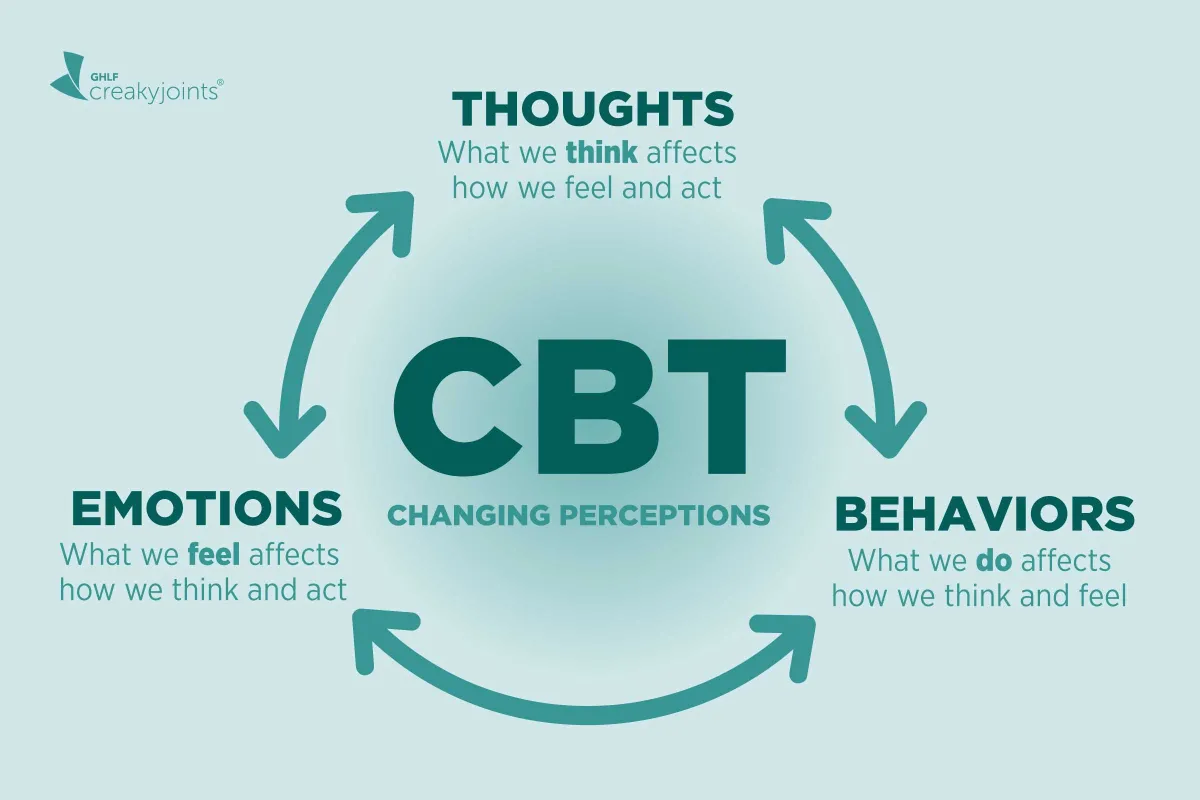Cognitive Behavioral Therapy (CBT) is a short-term, effective type of therapy that focuses on the connection between your thoughts, feelings, and behaviors. It helps you understand how these elements influence each other and provides tools to solve current problems. Unlike some therapies, CBT is designed to show results in a few weeks to a few months.
How Does CBT Work?
CBT is based on the idea that your thoughts affect your emotions, which then influence your actions. For example:
- Negative thoughts can lead to negative feelings and unhelpful behaviors.
- Positive thoughts can lead to positive feelings and better actions.
Your therapist will teach you skills to change unhelpful thought patterns and behaviors. These skills can be used for the rest of your life.
What Happens in CBT?
During CBT, your therapist will help you:
- Identify problems in your daily life.
- Recognize unhelpful thought patterns.
- Replace negative thoughts with positive ones.
- Learn and practice new behaviors.
Your therapist will choose the best strategies based on your specific needs.
Common CBT Techniques
1. Cognitive Restructuring (Reframing)
This technique helps you challenge negative thoughts. For example:
- Instead of thinking, “I’m useless because I made a mistake,” you might learn to think, “I made a mistake, but I’m still a valuable person.”
2. Guided Discovery
Your therapist will ask questions to help you see different perspectives and challenge your assumptions. This helps you find more helpful ways of thinking.
3. Exposure Therapy
This technique is used to face fears or phobias. Your therapist will gradually expose you to what scares you, helping you build confidence and coping skills.
4. Journaling and Thought Records
Writing down your thoughts helps you track negative patterns and replace them with positive ones. It also helps you see your progress over time.
5. Activity Scheduling
If you avoid certain tasks due to fear or anxiety, scheduling them can help. This reduces decision-making stress and builds good habits.
6. Behavioral Experiments
These are used to test catastrophic thoughts. For example, if you think something bad will happen, you’ll see if it actually does. Over time, you’ll learn that your fears are often exaggerated.
7. Relaxation Techniques
CBT teaches skills like deep breathing, muscle relaxation, and visualization to reduce stress and anxiety.
8. Role Playing
Role-playing helps you practice handling difficult situations. It can improve problem-solving, communication, and social skills.
9. Successive Approximation
This involves breaking big tasks into smaller, manageable steps. Each small success builds your confidence.
What Happens in a CBT Session?
- First Session: You’ll discuss your problems and goals with your therapist. They’ll create a plan to help you achieve those goals.
- Follow-Up Sessions: These usually last about an hour and happen once a week. You’ll work on specific techniques and may get homework, like worksheets or journaling.
It’s important to feel comfortable with your therapist. If you don’t, consider finding someone else who’s a better fit.
What Can CBT Help With?
CBT can help with many issues, including:
- Stressful situations
- Anxiety and fear
- Managing emotions like anger or sadness
- Grief and loss
- Physical health problems
- Improving communication and problem-solving skills
It’s also effective for conditions like:
- Anxiety disorders
- Depression
- OCD
- PTSD
- Phobias
- Eating disorders
- Chronic pain
Are There Any Risks?
CBT is generally safe, but there are a few things to keep in mind:
- It can feel uncomfortable to confront your problems at first.
- Techniques like exposure therapy may temporarily increase anxiety.
- CBT requires commitment and practice to see results.
Think of CBT as a lifestyle change that helps you build better habits over time.
Finding a CBT Therapist
Look for a licensed therapist trained in CBT who has experience with your specific issue. You can ask your doctor for recommendations or search for professionals like:
- Psychologists
- Psychiatrists
- Social workers
- Counselors
CBT is a powerful tool for managing anxiety, stress, and other challenges. With the right therapist and commitment, it can help you make lasting positive changes in your life.

